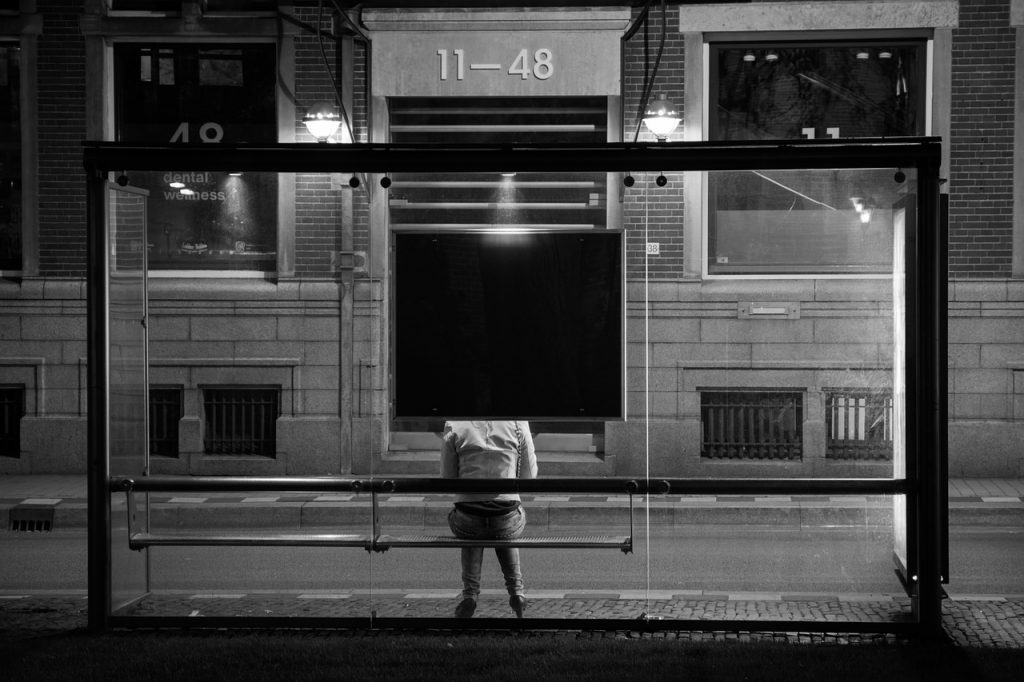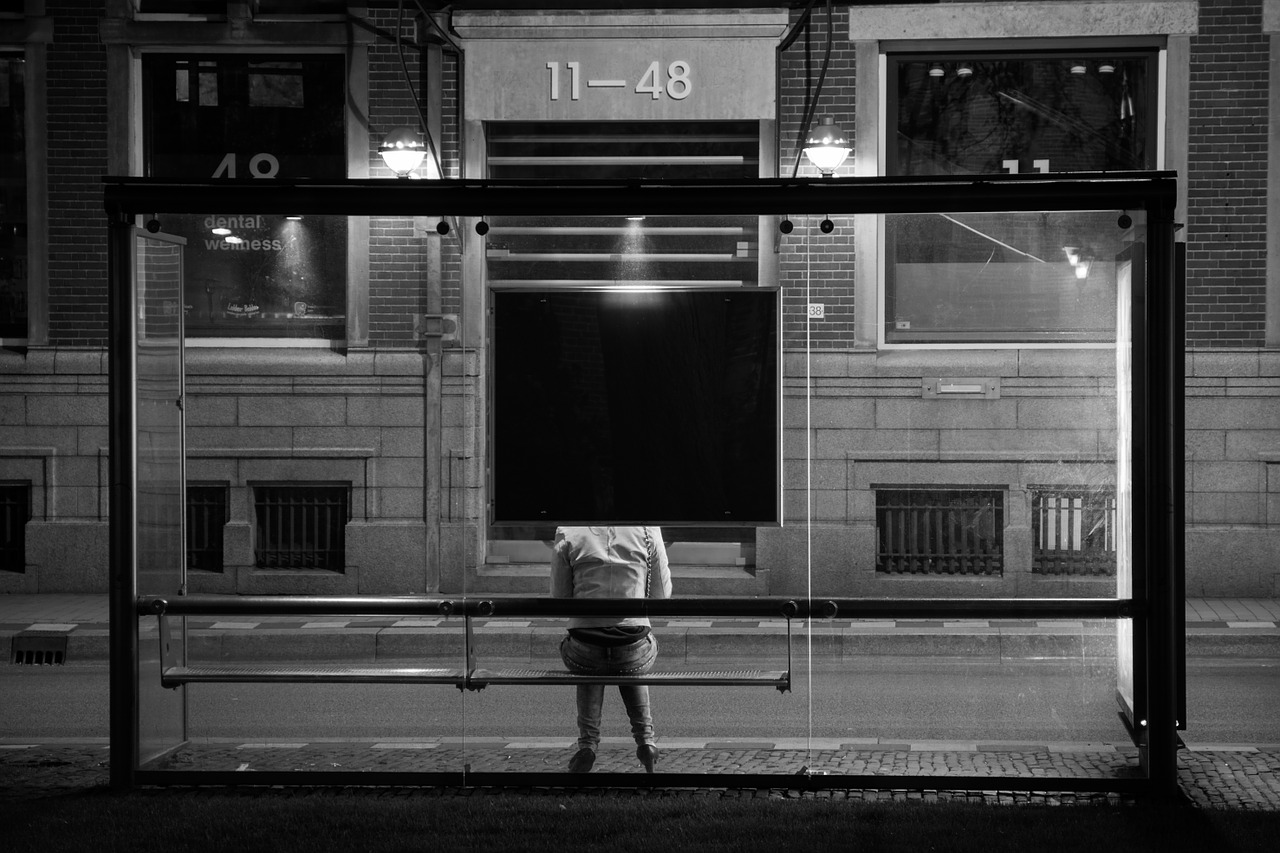Cassie sat on the bench at the bus stop, shivering against the December wind. She pulled the gray flannel coat closed, but the wrap had no buttons and her fingers had difficulty managing the task. Her chapped lips stung, but when she pressed them together, it pulled at her stitches, bringing tears. She closed her eyes and tried to think of June.
She left home the day after Thanksgiving. She almost laughed at the thought. Thanksgiving. Not at her house. Mom mixed half a cup of rum into the glaze for the yams and then spent the rest of the day finishing off the bottle. When Cassie asked to say grace for the meal, Mom went hysterical.
Supper ended with a call to 9-1-1 and twenty-six stitches running from just above Cassie’s left ear to the corner of her mouth. The shoe that her mother had thrown at her ended up breaking the antique gravy boat. Mom cried for the gravy boat.
At seventeen, Cassie knew she wasn’t ready to live alone, but she also knew that she wanted to live to be eighteen. She found a tiny garage apartment four blocks from her high school and only three bus stops from her part-time job at the bakery. In another eight months, she would move into a dorm anyway.
She waited and watched. The skinny kid with the black Lab walked past her. That meant it was a quarter to eight. Ten minutes to go. The blonde ponytail bounced by, wearing pink velour. It must be Tuesday.
Everything around her had a routine, and she loved it. From a house of chaos, she emerged to find a world that ran like clockwork. Other people ate the same food at the same places at the same times every day. They wore the same clothes, walked the same dogs, and ran the same routes, rarely missing a step.
In a few minutes, the tall businessman in the power tie would come and buy a newspaper from the machine behind her. He would swear and then walk down the block.
Cassie turned to watch as he approached. She smiled to herself. Green tie. Yes, Tuesday. She waited as he walked to the vending machine, but something was wrong. Before she could hear the whine of the metal spring on the door, he was already swearing. She turned around to see. The machine was empty.
He muttered something unintelligible and kicked the leg of the big orange metal box. His temper scared her, triggering an automatic response. She looked around and saw a newspaper tucked under her bench at the other end. She grabbed it.
“Sir, you can have this one if you like,” she offered.
Power Tie growled at her and grabbed the paper from her hands. “I don’t need charity, little girl.”
Cassie stepped back, not expecting an attack.
“I’m not like you or any of your other street people. I don’t get my food or clothes or even my news from the garbage!” He turned away from her, marched the six paces to the wire mesh trash bin at the corner, and threw her gift away. He crossed the street to where his car was parked.
Cassie shivered. His outburst was colder than the breeze.
She took a deep breath that burned all the way to her lungs and then released it slowly. He must have had a bad day.
She walked to the waste bin to retrieve the newspaper. She thought that perhaps she should take up reading it, since she was on her own, now. As she plucked the folded paper from the top of the bin, she heard screeching tires.
She spun around at precisely the second a silver sedan crashed through the bus stop bench and into the vacant brick building behind it. Without a thought, Cassie ran to the car. It was Power Tie. His door had flown open and his body hung mostly out, held only by his seat belt. He wasn’t breathing.
“Call a doctor! Call 9-1-1!” Cassie screamed. She knew what she must do.
Cassie pulled him out to the sidewalk and knelt at his side. She checked his mouth and neck and began chest compressions.
“One, one thousand, two, one thousand, three, one-thousand,” she said, as others began to gather around her. She puffed two heavy breaths into the man’s mouth.
She moved back to his chest and counted again. Three pumps, two breaths—just as she had done before with Mom.
The seconds ticked away. Three more pumps, two more breaths. She wasn’t cold anymore. Three pumps, two breaths. She heard sirens. Three pumps, two breaths. The sirens blared louder. Three pumps, two breaths.
Power Tie’s eyes fluttered and he coughed. Cassie rocked back on her heels and took a breath for herself. The paramedics swarmed the man on the ground.
She felt something wet on her face and neck. Tears.
A paramedic threw a blanket around her shoulders. “Come with me,” he said.
She walked, or imagined she walked, to the ambulance with the EMT. “Is he going to be all right?” she asked, watching them load the gurney with Power Tie inside the truck.
“We’ll know soon,” he said. “I want you to come with us. We need to see where you’re hurt.”
Cassie shook her head. “I’m not hurt at all.”
“You have blood all over you,” the man explained. “You’re hurt.”
Cassie looked down at her coat. It was saturated with blood. Her hand flew to her face. Her stitches opened. She nodded and climbed into the ambulance for the five-minute ride to the emergency room.
More stitches. She waited two hours for a nurse to sign her out.
Cassie felt relief when, from down the hall, she heard the graveled voice of Power Tie asking to meet the paramedic who saved his life. He made it. He was going to be okay.
The EMT who had taken care of her approached and took her gently by the arm. “I need you to come with me,” he said.
She walked with the man down the hall and behind a curtain to find Power Tie sitting up in a bed, hooked to an IV bag and several monitors. He didn’t look as tall without his suit and tie. He looked tired and kind.
“This is the young woman who saved your life. If she hadn’t administered CPR when she did, you never would have made it,” the doctor said.
Cassie had heard doctors say things like this before. She thought this type of speech must be in doctors’ textbooks.
Power Tie believed it, though. He took Cassie’s hand and squeezed it weakly. “You’re the little girl I yelled at, not two minutes before my heart attack. Why would you save my life?”
Cassie tried to smile, but couldn’t push more than a weird grimace past the stitches and anesthetic. “I guess we saved each other. If you hadn’t thrown the paper in the trash, I wouldn’t have gone to pick it out. I would have been sitting on the bench you ran down.”
Tears filled the man’s eyes. He couldn’t speak. Nobody in the room could.
“What can I do for you?” he asked her, once his gravelly voice returned.
“You already did it,” Cassie said. “I used to ask God why my life was like it was. Now I know why. If it hadn’t been just so, I wouldn’t have been at that place, at that time, and I wouldn’t have known CPR. You needed someone like me to be there. You must be someone very important to God.”
“Then that’s something we have in common,” he said.
by Kimberly Black, July 4, 2012
Dysfunction, family, judging others, helping others, saving lives, accident


